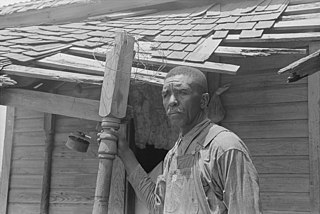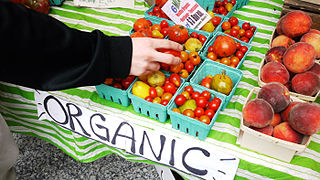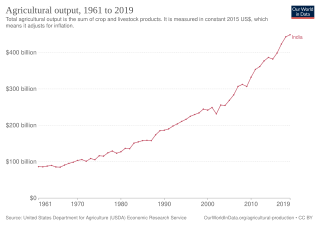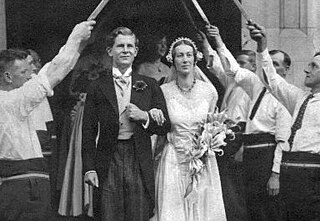Related Research Articles

The Common Agricultural Policy (CAP) is the agricultural policy of the European Union. It implements a system of agricultural subsidies and other programmes. It was introduced in 1962 and has since then undergone several changes to reduce the EEC budget cost and consider rural development in its aims. It has however, been criticised on the grounds of its cost, its environmental, and humanitarian effects.

A tenant farmer is a person who resides on land owned by a landlord. Tenant farming is an agricultural production system in which landowners contribute their land and often a measure of operating capital and management, while tenant farmers contribute their labor along with at times varying amounts of capital and management. Depending on the contract, tenants can make payments to the owner either of a fixed portion of the product, in cash or in a combination. The rights the tenant has over the land, the form, and measures of payment vary across systems. In some systems, the tenant could be evicted at whim ; in others, the landowner and tenant sign a contract for a fixed number of years. In most developed countries today, at least some restrictions are placed on the rights of landlords to evict tenants under normal circumstances.

The Ministry of Agriculture, Fisheries and Food (MAFF) was a United Kingdom government department created by the Board of Agriculture Act 1889 and at that time called the Board of Agriculture, and then from 1903 the Board of Agriculture and Fisheries, and from 1919 the Ministry of Agriculture and Fisheries. It attained its final name in 1955 with the addition of responsibilities for the British food industry to the existing responsibilities for agriculture and the fishing industry, a name that lasted until the Ministry was dissolved in 2002, at which point its responsibilities had been merged into the Department for Environment, Food and Rural Affairs (Defra).

The organic movement broadly refers to the organizations and individuals involved worldwide in the promotion of organic food and other organic products. It started during the first half of the 20th century, when modern large-scale agricultural practices began to appear.

The Soil Association is a British registered charity, working to transform the way Britain eats, farms and cares for the natural world. It was established in 1946. Their activities include campaigning for local purchasing, public education on nutrition and certification of organic foods, and against intensive farming.

The history of agriculture in India dates back to the Neolithic period. India ranks second worldwide in farm outputs. As per the Indian economic survey 2018, agriculture employed more than 50% of the Indian workforce and contributed 17–18% to the country's GDP.
RRA can refer to:

Angola is a potentially rich agricultural country, with fertile soils, a favourable climate, and about 57.4 million ha of agricultural land, including more than 5.0 million ha of arable land. Before independence from Portugal in 1975, Angola had a flourishing tradition of family-based farming and was self-sufficient in all major food crops except wheat. The country exported coffee and maize, as well as crops such as sisal, bananas, tobacco and cassava. By the 1990s Angola produced less than 1% the volume of coffee it had produced in the early 1970s, while production of cotton, tobacco and sugar cane had ceased almost entirely. Poor global market prices and lack of investment have severely limited the sector since independence.

Located in the Sahelian and Saharan zones, Mauritania has one of the poorest agricultural bases in West Africa. Most important to the rural economy has been the livestock subsector. Between 1975 and 1980, herding engaged up to 70 percent of the population, and sedentary farmers constituted about 20 percent of the population. The vast majority of the population lived in the southern one-third of the country, where rainfall levels were high enough to sustain cattle herding. Farming was restricted to the narrow band along the Senegal River where rainfall of up to 600 millimeters per year and annual river flooding sustained crop production as well as large cattle herds. In the dry northern two-thirds of the country, herding was limited to widely scattered pastoral groups that raised camels, sheep, and goats, and farming was restricted to date palms and minuscule plots around oases.

Henry Rolf Gardiner was an English rural revivalist, helping to bring back folk dance styles including Morris dancing and sword dancing. He founded groups significant in the British history of organic farming. He sympathised with Nazism and participated in inter-war far right politics. He organised summer camps with music, dance and community aims across class and cultures. His forestry methods were far ahead of their time and he was a founder member of The Soil Association.

Jorian Edward Forwood Jenks was an English farmer, environmentalism pioneer and fascist. He has been described as "one of the most dominant figures in the development of the organic movement".
Montague Edward Fordham (1864–1948) was an English agriculturalist and advocate of rural reform. He belonged to the Religious Society of Friends, and was a historian and barrister by profession.

Sir Reginald George Stapledon FRS was an English grassland scientist and pioneer environmentalist.
Despite the crisis in Syria, agriculture remains a key part of the economy. The sector still accounts for an estimated 26 percent of gross domestic product (GDP) and represents a critical safety net for the 6.7 million Syrians – including those internally displaced – who still remain in rural areas. However, agriculture and the livelihoods that depend on it have suffered massive losses . Today, food production is at a record low and around half the population remaining in Syria are unable to meet their daily food needs.
The Agricultural Development and Marketing Corporation, usually known as ADMARC, was formed in Malawi in 1971 as a government-owned corporation or parastatal to promote the Malawian economy by increasing the volume and quality of its agricultural exports, to develop new foreign markets for the consumption of Malawian agricultural produce and to support Malawi's farmers. it was the successor of a number of separate marketing boards of the colonial-era and early post-colonial times, whose functions were as much about controlling African smallholders or generating government revenues as in promoting agricultural development. At its foundation, ADMARC was given the power to finance the economic development of any public or private organisation, agricultural or not.

Frank Newman Turner, NDA, NDD, FNIMH, was a British pioneering organic farmer, writer and broadcaster, who, based on his experience of natural treatment of animals, later became a consulting medical herbalist and naturopath. His books Fertility Farming, Fertility Pastures, and Herdsmanship are regarded as classics of practical organic husbandry.
Friend Sykes (1888–1965) was an English organic farmer and writer.

Edgar J. Saxon (1877-1956) was a British environmentalist, naturopath and alternative health writer. He was a pioneer of the organic movement.
Guy Theodore Wrench was a British agronomist, nutritionist, and physician. He was a pioneer of the organic movement.
Agriculture makes up a significant proportion of the Gambia's economy, comprising 25% of its GDP. About 75% of workers in the Gambia are employed within the agricultural industry. The main cash crops produced in the country are groundnuts, millet, sorghum, mangoes, corn, sesame, palm kernel, and cashews. The main staple crop produced is rice.
References
- 1 2 3 4 P. Conford, 'Finance versus Farming: Rural Reconstruction and Economic Reform 1894-1955', Rural History, 2002, Vol.13 No.2, p. 229
- 1 2 3 Peter Barberis, John McHugh, Mike Tyldesley, Encyclopedia of British and Irish Political Organizations, 2002, p. 32
- ↑ Conford, 'Finance versus Farming', pp. 229-30
- ↑ Conford, 'Finance versus Farming', p. 230
- ↑ Conford, 'Finance versus Farming', p. 233
- ↑ G. Macklin, Very Deeply Dyed in Black, New York: IB Tauris, 2007, p. 66
- ↑ Agricultural Policy debates from Hansard